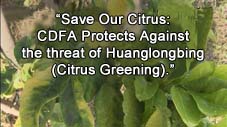This website has been designed to help answer questions about ACP and HLB and the threat to all California citrus growers both in commercial and backyard settings.
All citrus and closely-related species are susceptible hosts for both the ACP insect and the HLB disease. There is no cure once a tree becomes infected. The diseased tree will decline in health and eventually die.
It is important to stress that CDFA conducts field surveys for ACP and other pests statewide. Recent detections of ACP in Tijuana, Mexico, reemphasize the importance of increased surveillance for ACP in neighboring San Diego County.
Survey methods for ACP include visual inspections of citrus trees by CDFA and county field inspectors, "sweep netting" for insects, and the placement of yellow panel "sticky traps" in host trees and shrubs in citrus nurseries, commercial citrus-producing areas and residential properties throughout the state. Additionally, sticky traps are placed at California fruit packing houses, specialty markets, retail stores and airports that receive such produce from areas known to be infested with ACP.
CDFA and county agricultural commissioners have educational posters and pamphlets on ACP and HLB. CDFA partners with the USDA, the University of California, California citrus associations and other stakeholders on outreach and research efforts against this insect and the disease it spreads.
Contact the CDFA Toll-Free Pest Hotline (1-800-491-1899) to report suspicious insects or disease symptoms in your citrus trees. Help us protect California agriculture from invading pests and diseases.















